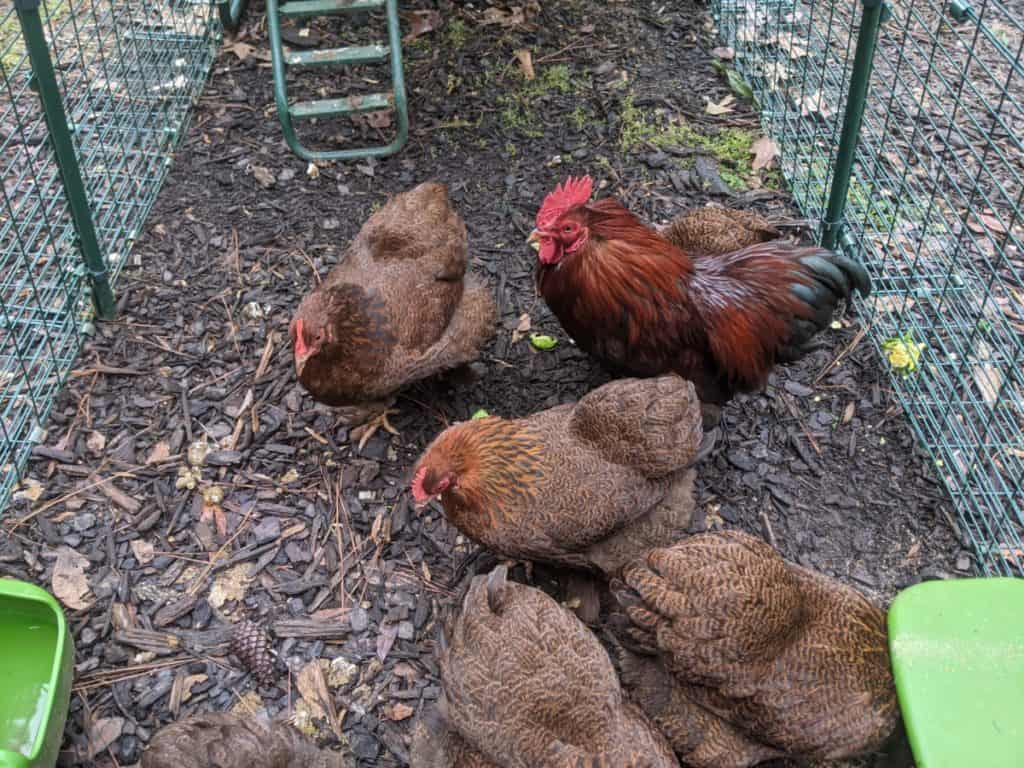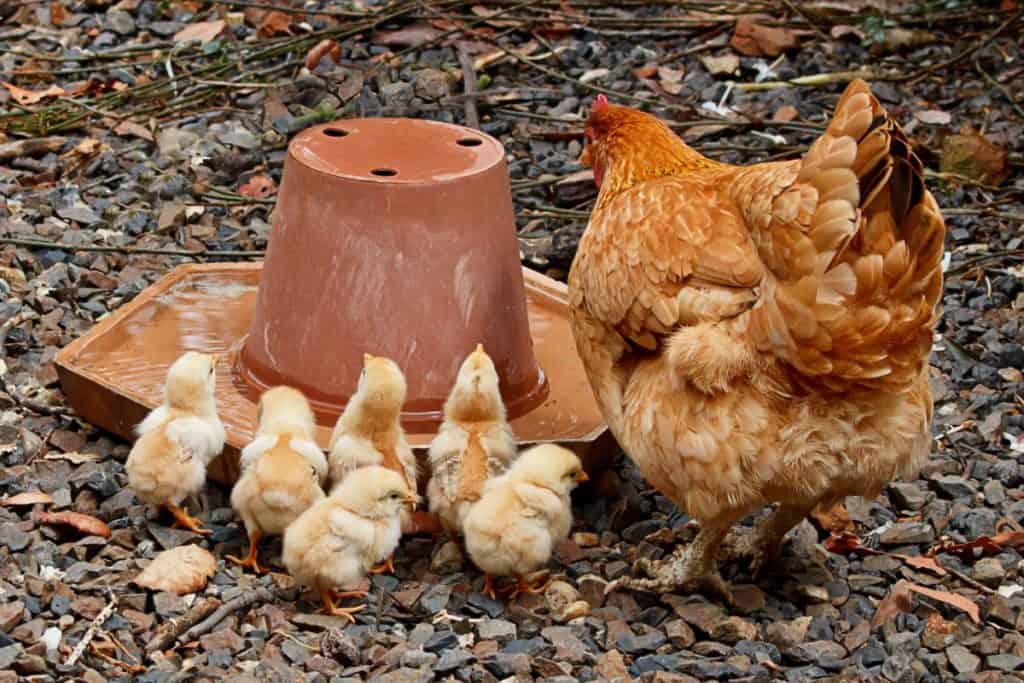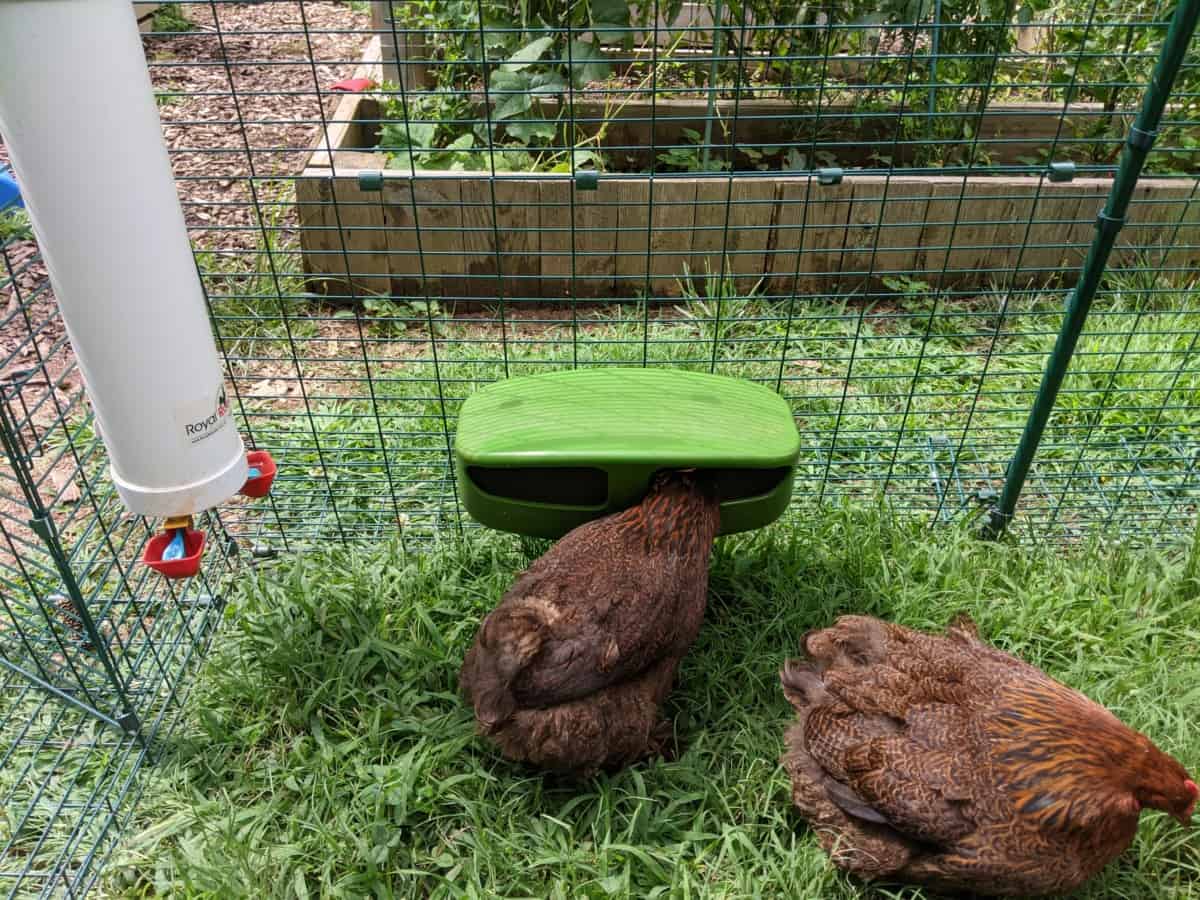The first thing that should ease your mind is that chickens are diurnal birds; they sleep at night and are active during the day. So you don’t have to worry that one of your chickens woke up for a midnight snack just to find an empty feeder. If you kept nightjars (for some inexplicable reason), it might have been a different story.
It is unnecessary to keep food and water in the coop at night; it comes down to a matter of preference or practicality. Chickens sleep at night and are not likely to wake up to eat; they eat and drink during the day. However, as with most animals, there should always be clean water available at all times in their run.
Chickens are primarily self-sufficient; however, you will require some know-how to keep them healthy. Feeding and watering guides are not complicated to follow once you get the basics sorted, you’ll get the hang of it in no time at all. However, brooding hens and chicks require a little more attention with regards to feeding and watering.

Do chickens need food at night?
Mostly, chickens are awake as long as the sun is out; when the sun sets, they go to sleep and stay that way until it rises again. Feeding during the night is not nearly as important as making sure they eat enough during the day.
However, if your hens are brooding, they take only short breaks to eat and drink, this might be during the day or night, so it might then be a good idea to keep the feeder stocked at night times while they keep the eggs warm.
Assuming you are making sure your birds have enough to eat during the day (see the feeding guide below), you need to make a choice where to keep their feeders.
If they don’t need food at night, does it still make sense to place the feeders inside the barn or coop? Or is there another reason to feed your chickens inside the pen? It all depends on your circumstances and gives us a list of some points to consider.
An extra feed should be stored in a container that has a lid.
Inside the Coop
Keeping the feeders fully stocked inside the barn or coop has the following advantages:
- Keeps their food dry on rainy days
- It gives your chickens access to food on hot or cold days when they hide inside
- Keeps other animals away from their food at night
- In case of an emergency (or sleeping late) you don’t have to worry about your chickens being hungry.
However, there are a few drawbacks of keeping the feeders inside that might leave you no choice but to leave the feeders outside:
- You might not have a coop big enough to have the food inside
- You need to be able to get inside the coop
- You’ll have more cleaning to do
- Excess water that spills could cause mold and health problems
- It can attract rodents
Outside the coop
If you cant place the feeders inside for any of the above reasons, it is not a total loss; however, here is the comparison for feeding outside the barn or coop:
- Chickens have to go out and soak up some vitamin D
- You don’t need a big coop
- Easy access and clean up
The other side of the coin:
- Rodents and other animals are attracted to the food
- Wet feed is wasted feed
- The feeders may be a constant sore-eye if that sort of thing bothers you
I would suggest purchasing feeders that protect the food from rain.
As you can see, whether you fill the feeders outside in the mornings or prefer to leave them with feed inside is merely a matter of what works best for you and your flock.
Do chickens need water at night?
They won’t die without water at night. Generally, with good weather, they can go for 48 hours without water. But – and this is true for all domesticated animals – fresh, cool water should always be available to them.
On a hot summer night, they might want to have a drink of water to cool down; this is because water helps them regulate their body temperatures. Keep the water out of their sleeping area is spilled water can cause mold and other pathogens.
Water is crucial for chickens:
- Digestive health – it moistens their crops; they need water to keep their crops and the food therein wet for easy digestion.
- When laying hens do not have access to water, they might stop laying eggs for up to two weeks. Water also assists in egg formation.
- Chickens can go into shock without enough water, especially in hot weather.
- They need water to drink, as with most living things.
How much water do chickens need?
To be safe, make sure your chickens always have access to clean water. Clean water is key; get proper water dispensers, or they are likely to walk all over the water dishes, which means you’ll constantly clean and refill.
Keep in mind that in winter, water can freeze, and although they might not need it to cool down, it is still important to make sure they can access water when they need to.
A chicken needs roughly 17 oz (500 ml) of water each day. If you have twenty chickens, you need to provide at least 340 oz (10 liters) of water a day.
You can install a water system for your chickens to make sure they never run out of water. Have a look at the video below on how to make a DIY water system. It is worth mentioning that it sounds easier than it looks.

Food and water for chicks
Now that we have covered chickens, it is necessary to expand on chicks’ food and water intake. Baby chicks will probably get up during the night to eat and drink water. So you will have to keep their feeders and water dishes full during the night.
Baby chicks must have access to water; they can die if you leave them without water, even for just a few hours. Baby chicks usually are kept in a warm environment because they don’t have their “big chick feathers” yet and need water to regulate their body temperature.
They might not need as much as chickens do, as they drink small amounts, but chick drinks water frequently.
Avoid giving them open or shallow water dishes because they’ll just cause a big mess; get proper water dispensers. A deep water dish is a drowning hazard for baby chicks; if you don’t have access to waterers, make sure any deep bowls are not easy to climb into. Remember, you want to keep their space as dry as possible; damp conditions for chicks may cause illness.
Is a feeding schedule necessary for chickens?
A feeding schedule will probably be wasted on a chicken and only limit your own time. Free-range chickens may eat less feed as they walk around pecking up all sorts of things during the day.
However, make sure they still have access to feed when they might need it. There is nothing wrong with filling the feeders every morning; you can work out how much food to put out by taking roughly five ounces of food per chicken.
You’ll soon learn when you put out too much or too little. If you put out too much food, there will be plenty left when they go to sleep. However, if the feeders are empty a few hours before sunset, you might be feeding them too little.
Ideally, there should only be a little left each day; enough to know the chickens on the lowest pecking order didn’t starve but so much that it wastes.
Feeding Baby Chicks
Feeding baby chicks is a different story; they will need at least five small feedings a day, more if they are a few days old. But be careful not to overfeed the chicks as it might lead to diarrhea. By two months old, they should be allowed to feed themselves from a feeder.
Conclusion
While you want to make sure that your chicks are full and your brooding hens have access to food and water in the barn, you’ll do no harm in only filling up the chicken feeders in the morning. Always remember the clean, cool water, and you’ll have a flock of happy chickens.

